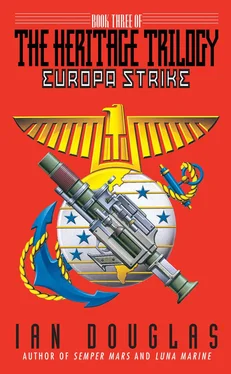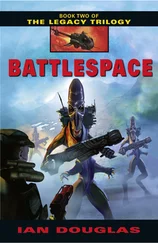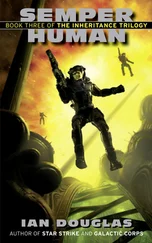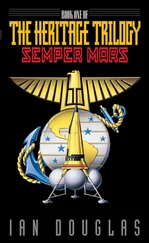“It looks like we’re going to have company after all,” Jeff replied. “The Star Mountain left Earth orbit fifteen hours ago. They’re on the way, a high-energy vector, at 2 Gs.”
“Shit. How long do we have?”
“Five days, if they boost the whole way with a turnaround in the middle.”
Kaminski frowned. “Doubling the Gs only knocks two days off the flight time? That doesn’t seem right.”
“The unforgiving equations,” Jeff said. “To halve the time you have to multiply the speed by four. To cut time down to a quarter, you square that, sixteen times the speed. The faster you push, the less time you have to take advantage of your high speed.”
“If you say so, sir. Still sounds like two plus two equals five.”
“They do,” Jeff said, grinning, “for moderately large values of two.”
“Well, anyway, we’ve got a Chinese transport on the way. Do we have a Peaceforcer running interference? I thought the JFK was covering our ass this month.”
The A-M cruiser John F. Kennedy was currently onstation in the Asteroid Belt, about four astronomical units out from the Sun.
“Right. The word is, the Kennedy’s tracking the Mountain, and will be moving to intercept. It’s going to be tight, though, to match course and speed with a Chinese bat coming straight out of hell. We have to be prepared for the possibility that the Mountain gives our people the slip.”
“And that other Chinese ship?”
“The Lightning? Still in a retrograde solar orbit, at one a.u. out. No new activity since they detonated that nuke three weeks back. S-2 is pretty sure she’s just carrying out weapons tests. No direct threat to us. They probably mean it as some kind of warning or message to Washington.”
“Yeah, and I suppose the Star Mountain is another message. Whatever happened to delivering messages by e-mail?”
“If she is, the JFK will stop the delivery. Just in case, though, I want to make sure our people have a shot at the latest CI-PLA sims.”
Current Intelligence sims—in this case, the latest information on the People’s Liberation Army—their equipment, logistics, weapons, armor, and technology—were basic software packages used in field training. They let the troops experience firsthand what was known about a potential enemy’s weapons and tactics.
“Affirmative, sir. We won’t have time between now and landing for everyone to head-cram. Especially with full inspections on the sched.”
“I know. We have a week before they get here, if they get here. Set up a sim-access schedule for after we land. Squad leaders and above should get first crack.”
“Aye, aye, sir.”
“Before landing, they should all have reviewed sims on extreme arctic conditions.”
Kaminski chuckled. “Those’ve been on the sched, Major. Don’t know how well they’ve sunk in, though, when it’s this hot and humid. The joke goin’ about the squad bay is that we’re using the ice-training sims to save on the air conditioning. The other is that the squad leaders watch the ice sims instead of porn. They’re more fun.”
Jeff grasped the bottom of his o.d. T-shirt and flapped the sodden material uselessly. When the air was this humid, things simply couldn’t dry through evaporation. It was as bad as being deployed in the jungle. “Well, I can’t see why anyone in his right mind would want to raise their body temperature aboard this bucket.” Tucking his shirt back in, he added, “Are the bugs all checked out?”
“Affirmative, Major. Everything except the final go/no-go launch checklists. The numbers’re uploaded to the Force data base.”
“Well, then, I guess we’re on track.” What else is there? He wondered. What am I missing?
“I’ll pass the word about the inspection, sir. With the major’s permission?”
“Carry on, Sergeant Major.”
“Aye, aye, sir.”
He checked the time—LED numerals within the skin on the back of his hand—and decided he had time for a quick sim-link himself. Walking past the table, he picked up a link helmet in an equipment locker against the bulkhead, then found a swivel-seat chair in one of the small office cubicles off the main compartment, and sat down.
The helmet, equipped with a dozen pressure-connection electrodes imbedded on the inside, nestled over his head with room to spare. He touched the adjustment key and let the smart garment software tighten the device gently into place. After pulling his PAD from its belt holster and plugging in the connection with the helmet, he slid the opaque eyeshield down, folded his arms, and leaned back in the chair as the soft buzz of the up connect trilled against his skull. Old-fashioned links had required surgically imbedded sockets, but low-frequency pulses could penetrate bone and stimulate the appropriate parts of the cerebral cortex.
There was a flash as the VR program booted up, and then he was standing in complete darkness, the sensations of lying back in the chair fading as they were overridden by software-generated illusions. A Marine general in long-obsolete o.d. utilities faced him…a belligerent-looking, wide-mouthed scowl, the man’s trademark expression, splitting a square and ugly face.
“Hello, Marine,” the figure rasped. “Whatcha need?”
“Some advice, Chesty. As usual.”
The image of General Lewis B. “Chesty” Puller hooked his thumbs in his Sam Browne belt and nodded. “Fair enough. Shoot.”
The AI he’d had patterned after Chesty Puller was resident in his PAD, though pieces of it also roamed the ship’s computer system, and the base network back at V-berg as well. The real Puller—the man was a legend in the Corps, a five-time winner of the Navy Cross—would never have spoken so informally with a major.
Or, on second thought…maybe he would have. Puller had had a rep for looking out for the men under his command, and for his lack of patience with idiots further up the chain of command than he. His attitude toward the brass, legend had it, had delayed his promotion to general until he’d been in for thirty-three years.
“We’ll be grounding on Europa in twenty-four, General,” he said. “I need to know what the hell I’m forgetting.”
That wide mouth shifted slightly in what might have been a lopsided smile. “There’s always something. You’ve taken care of the checklist shit.” It was a statement, not a question. His AI software multitasked with his PAD’s operating system; Chesty had attended the staff meeting a few moments ago, albeit invisibly, listening in through the computer’s audio, and was aware of everything Jeff said and did.
Such electronic advisors were usually called secretaries in civilian life, and aides in the military. They were supposed to have the personae of assistants. Jeff had received some grief from fellow Marines over his decision to have his aide programmed to mimic an old-time Marine general, and Chesty Puller himself, no less.
Jeff had insisted on the programming, however, though other officers usually had aides that ran the gamut of personalities from Jeeves-type butlers to eager young junior officers to sharp-creased NCOs to sexy women or, in the case of one Marine officer Jeff knew, a devastatingly handsome young man. His choice wasn’t exactly traditional…but he preferred the electronic persona as a reminder that he needed to tap the command experience of someone who’d been in the Corps for a long time, who knew its ways, its customs, its heritage as no one else.
“Number one,” Puller’s image told him, “is to talk with your men. Work with them. Let them see you.”
“I’ve been discussing things with Kaminski—”
“I’m not talking about your topkicks, son. Yeah, you listen to your NCOs. They’re your most experienced people, and they’ll tell you what you need to know. What I’m sayin’ now, though, is to make yourself accessible to your men. Especially with that gold oak leaf on your collar.”
Читать дальше












